Interviews and Questionnaires
Since 2014, the JDM program has been developing and implementing activities to promote student learning, improve teachers’ teaching and assess their knowledge, from building mathematical ideas and motivation for students to further developing students’ mathematical literacy in response to the implementation of the 12-year curriculum. The JDM program is divided into three major areas: lesson plan/module pack development, prospective lecturer/teacher training, and student learning activities. In each of these areas, interviews and questionnaires are conducted by different businesses in order to gain a better understanding of the effectiveness of the program and to facilitate adjustments and modifications to the future direction of the program.
Research and Development of Modules
Feedback questionnaire for designers' workshop
In order to make the development of foundation modules more smoothly, the Center held the “Mathematics Foundation Modules Designer Training Workshop” from 2015 to 2017 and the “Mathematics Foundations in the Classroom Modules Designer Training Workshop” from 2017 to 2019. We hope that through systematic training, we can make the modules designed by designers more complete. The purpose of this questionnaire is to help the Mathematics Education Center and the mathematics education sector to understand how the Module Designer Workshop can help the teachers in the field and make it more complete.
Teacher Professional Development
Feedback Questionnaire for Prospective Instructor Training
After half a year of brainstorming since 2020, the JDM R&D team settled on the effective strategy of “refining teachers’ questioning” and has continued to conduct the “Prospective Lecturer Training Workshops” since then, which are divided into two types of prospective lecturer training workshops, the 2020 Literacy Foundation Package and the 21st Century Literacy Module Package, according to the four cores of the Literacy Package, using the teaching videos and their verbatim scripts as materials. The workshop is designed according to the four core principles of the literacy package, to refine the questions for teacher intervention, and to smoothly guide the students’ literacy performance. The purpose of the workshop is to train more co-presenters for the module to facilitate the promotion of mathematics literacy teaching and to produce a future co-presentation manual that can be used. This questionnaire will also help the Mathematics Education Center and the mathematics education community to understand the benefits of the workshop to the teachers in the field, and to analyze the results of the questionnaire in order to reform the content of the training courses and to enhance the literacy teaching skills of the participating teachers more effectively.
For example, the following is an analysis of some of the feedback questionnaires from the recent 21st Century Prospective Lecturer Training Workshop. The first part of the questionnaire investigated the participating teachers’ awareness and motivation of literacy teaching before the workshop; the second part of the questionnaire asked the participating teachers about their opinions and study status regarding the workshop content; the third part of the questionnaire observed whether the teachers were willing to apply and integrate literacy teaching into their own teaching after the workshop. From the full score of 5, we can see that the prospective instructors have a very positive opinion of the training workshop.
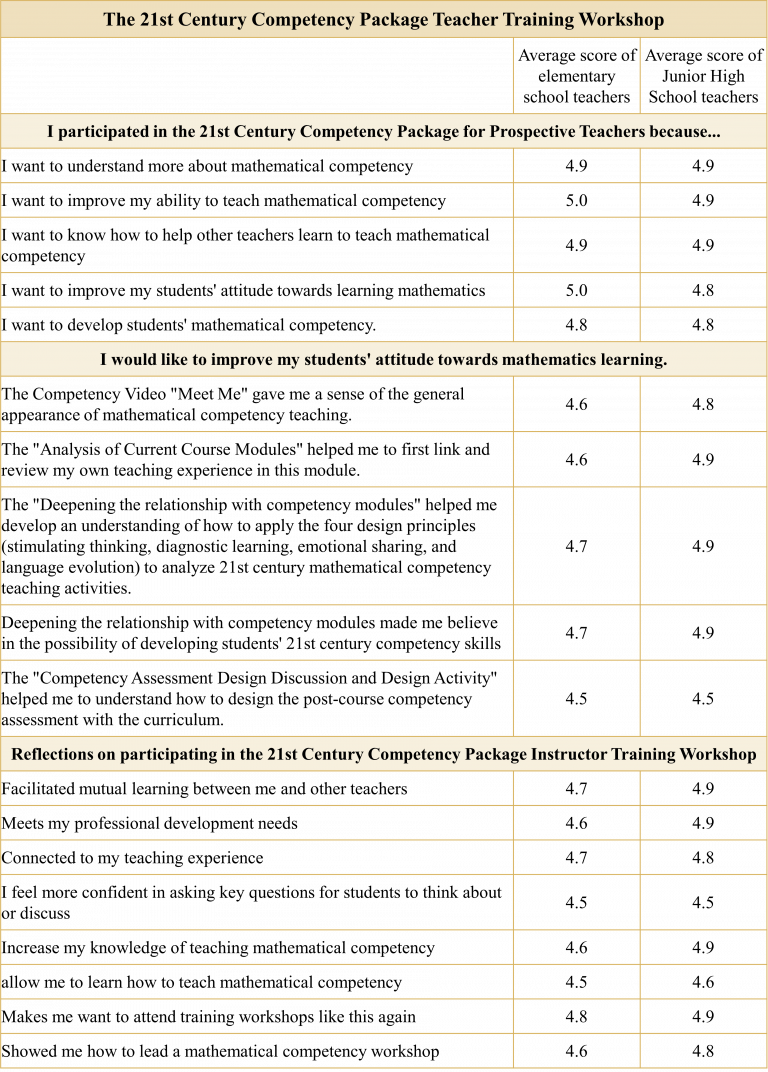
Feedback Questionnaire for the Mathematics Activity Teacher Workshop
The feedback questionnaire of the Mathematics Activity Teacher Training Workshop was analyzed in four aspects, namely, “the activity teacher training was useful”, “the training content was useful for learning”, “the willingness to participate in the training again”, and “the willingness to look forward to further professional growth”, to investigate whether the teachers’ participation in the workshop could enhance their teaching and whether they were willing to bring the modules into the classroom to integrate into their teaching. From the full score of 5, it can be seen that the teachers of Elementary School and Junior High School have a very high level of agreement that “activity teacher training is useful”, while the other three aspects are also rated quite positively.
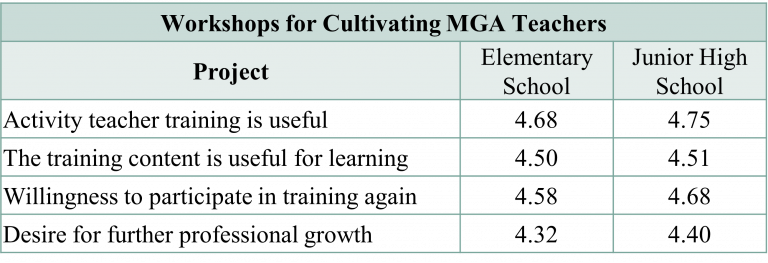
Feedback questionnaire for the foundations in the classroom workshop
The feedback questionnaire of the foundations in the classroom workshop was analyzed with four aspects, namely, “foundations in the classroom is useful”, “the content is useful for learning”, “the relevance of foundations in the classroom to teaching” and “course satisfaction”. The survey investigated whether the teachers’ participation in the workshops could enhance their own teaching and whether they were willing to bring the modules into the classroom to integrate into their teaching. From the full score of 5, it can be seen that the teachers of Elementary and Junior High School were quite satisfied with the “curriculum satisfaction” of the workshop, while the other three aspects were also rated quite positively.
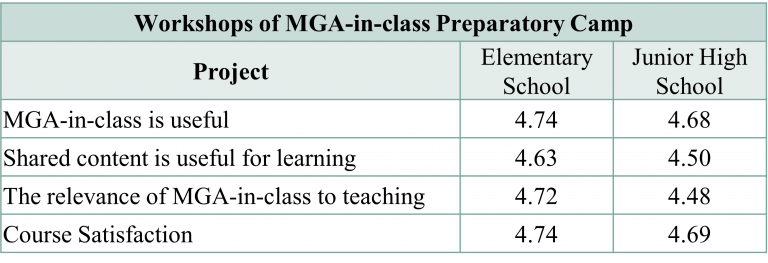
Feedback questionnaire for the 2020 Literacy Pack workshop
The feedback questionnaire for the 2020 Literacy Foundations Pack workshop was analyzed in four areas: “The Literacy Foundations Pack is useful”, “The content is useful for learning”, “The relevance of the Literacy Foundations Pack to teaching”, and “Course satisfaction”. From the full score of 5, it can be seen that the teachers of Elementary School and Junior High School agree with the “relevance of the Literacy Pack to teaching”, and the other three aspects are also quite positive.
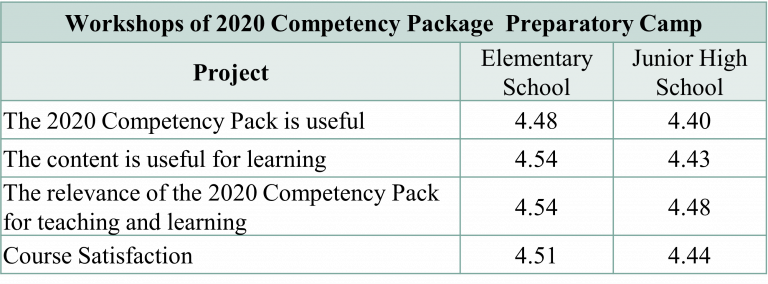
Student learning activities
Mathematics foundations in the classroom: National group, Junior High School group
Before and after the Math Foundations in the Classroom workshop, students were asked to fill out the Foundations in the Classroom Pre-school Questionnaire and the Foundations in the Classroom Post-school Questionnaire. Each question had four options: strongly disagree”, “disagree”, “agree”, and “strongly agree”, and each option was assigned a score of 1-4, and the average of the student feedback survey was calculated separately. In addition, the options of strongly disagree, disagree, and consider as disagree; agree, and strongly agree were considered as agree, and the percentages of agree were calculated respectively.
The mean scores and percentages of agreement for the pre-school and immediate post-school questionnaires were higher than those of the pre-school questionnaire, which shows that students have a positive opinion of the Math Foundations in the Classroom.
The following table compares the pre-school and immediate after-school questionnaires for the Math Foundations in the Classroom Program (National and Junior High School groups).
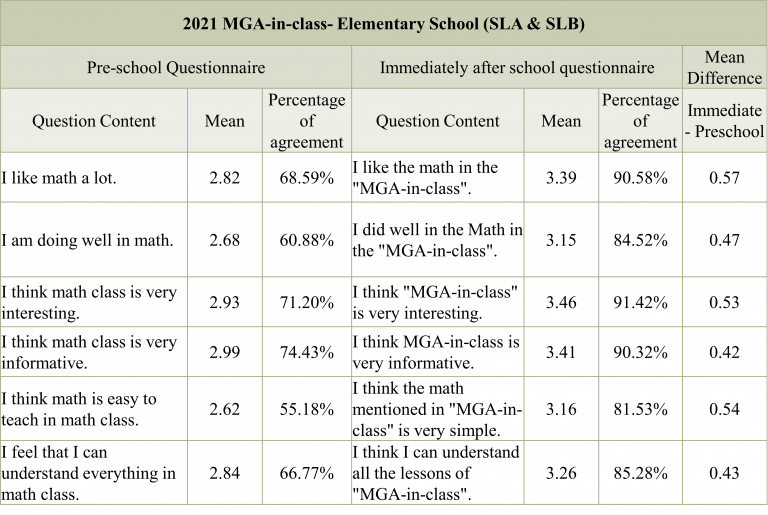
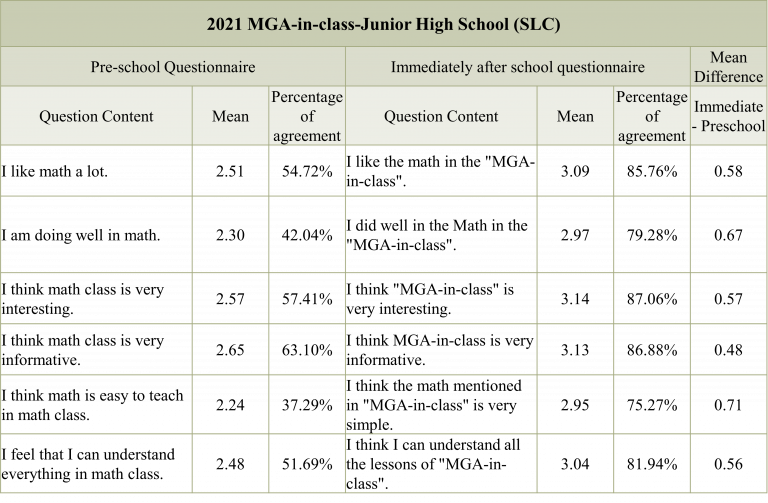
The student feedbak of math foundations in the classroom




Mathematical Literacy Packages for Teachers: Elementary School and Junior High School Division
Before and after the “Mathematical Literacy Packages”, students will be asked to fill out the “Pre-school Questionnaire” and “Post-school Questionnaire”. Each question had four options: “strongly disagree”, “disagree”, “agree”, and “strongly agree”, and each option was assigned a score of 1-4, and the average of the student feedback survey was calculated. In addition, the options of strongly disagree, disagree, and consider as disagree; agree, and strongly agree were considered as agree, and the percentages of agree were calculated respectively.
The mean scores and percentages of agreement for the pre-school and immediate after-school questionnaires were higher than those of the pre-school questionnaire, which shows that students have a positive opinion of the Mathematics Literacy Pack.
The following table compares the pre-school and immediate post-school questionnaires for students in the Mathematics Literacy Packages (National Group and Junior High School Group).
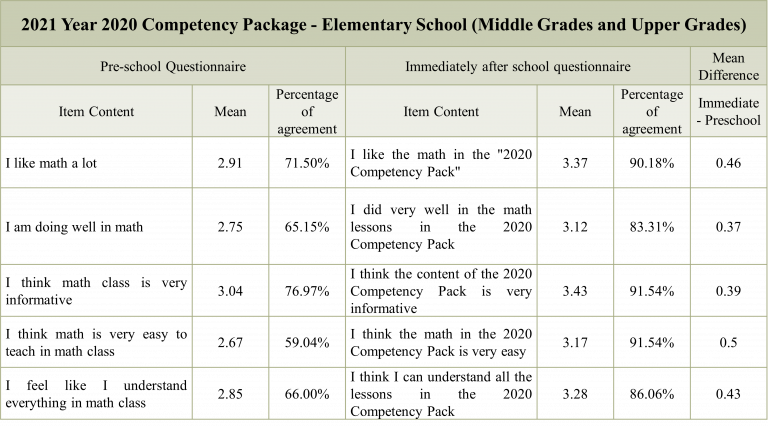
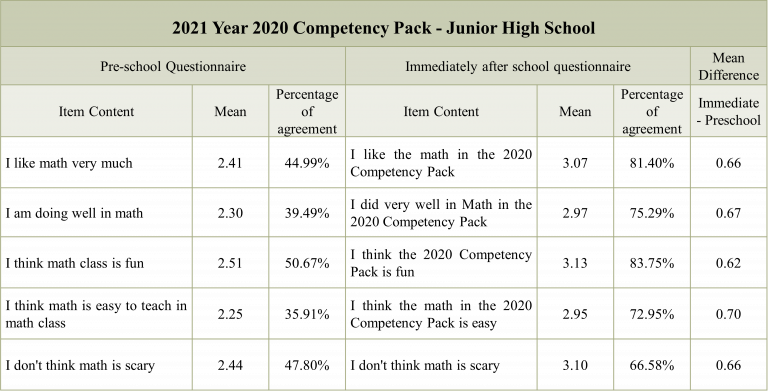
The student feedbak of Quasi-Lecture's Teaching Practice in Competency Grounding Activity Package
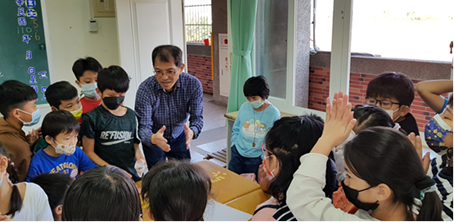



Research and Development of Modules
Expert Visits for Experimental Teaching
After the new lesson plans are developed, the designers conduct experimental teaching to understand their strengths and weaknesses. Expert professors visit the class and provide teaching suggestions after the class to further improve the lesson plans. Since 2017, about 6-10 lesson plans are selected for expert visits each year. The number of visits will be twice, but will be adjusted according to actual needs.


Student Learning Activities
Expert Visits for Course Activities
In order to ensure the quality of the implementation of activities, we plan to invite scholars, experts, and teachers from the central counseling team to visit the center from time to time according to the schedule of activities, and to check whether the situation is in line with the spirit of the center’s activities. The following is an example of the analysis for the year 2020.
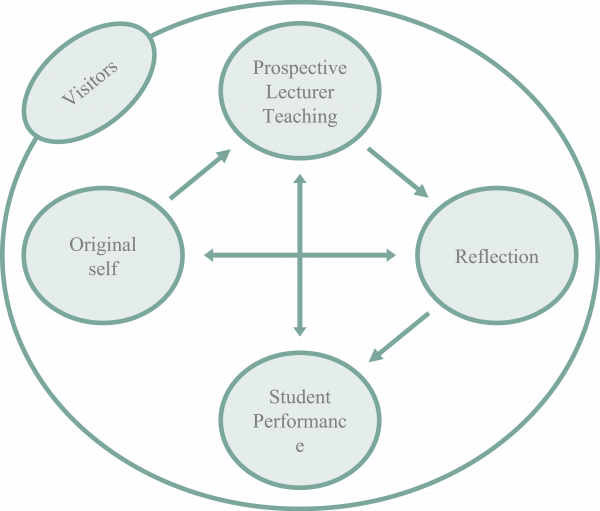
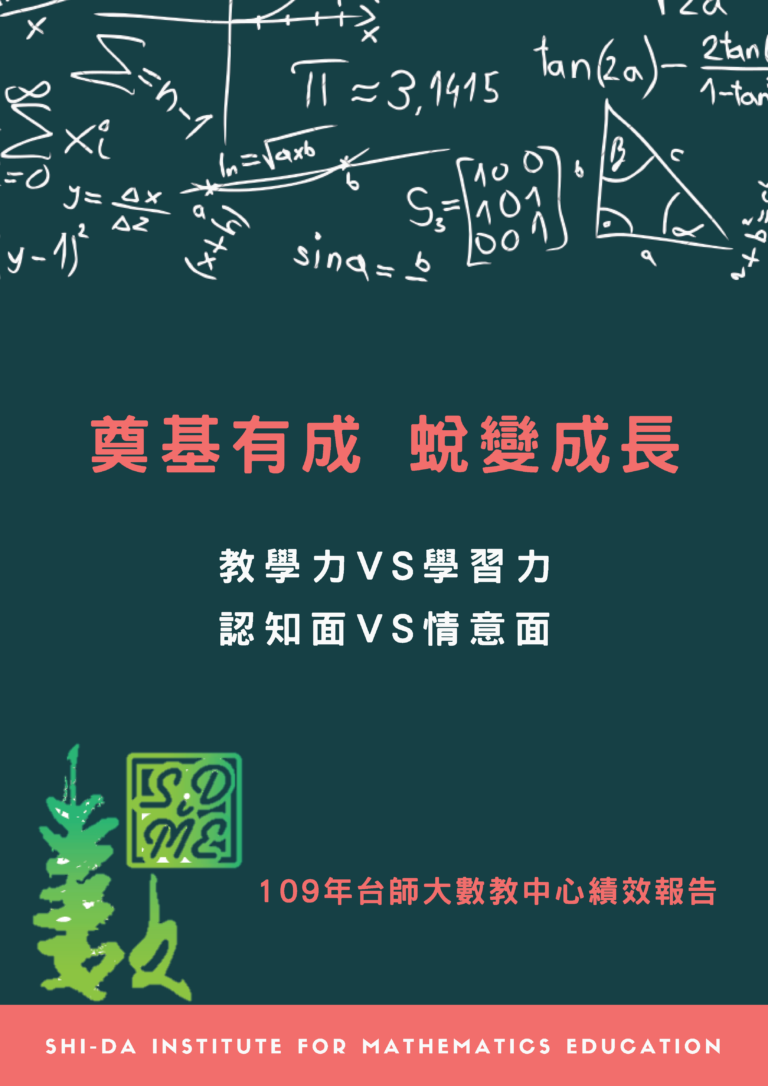
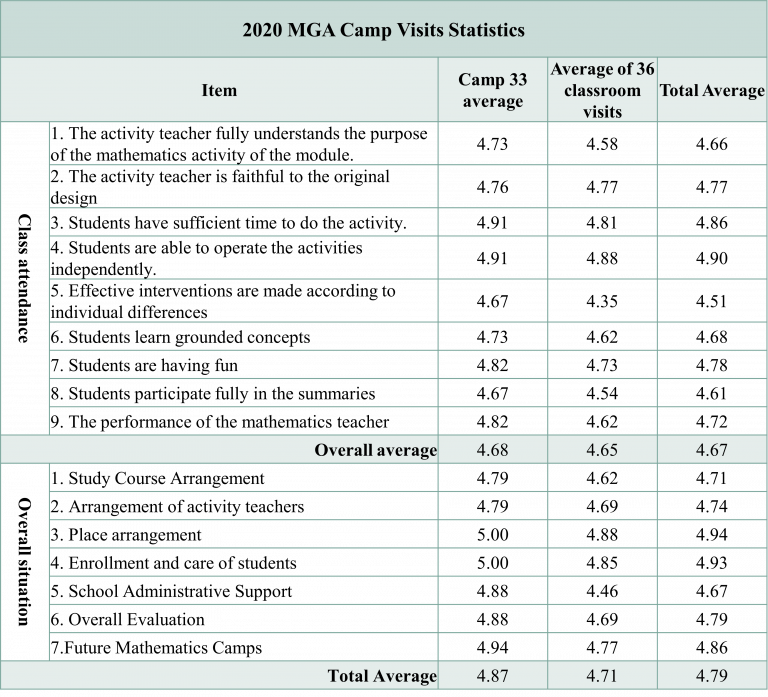
Total Analysis of 2020 Camp Team and Classroom Visits
- The moment I fell in love with math_I regained my love for math at math camp
- Students began to participate in math activities and had hope for general math classes.
- Students get a little closer to math
- Math is not boring, and it can be fun
- Math is not just about calculating, and it is not just in math textbooks
- After returning to the math classroom, the impact of Good Fun Math Camp on students’ learning of math from their point of view
- I started to change my mind about math class
- I can understand and start to think and solve problems.
- I dare to ask questions when I don’t understand
- I found out that math is everywhere in my life
- I have more confidence and courage to face it
- I like math more